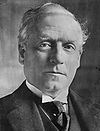Herbert Asquith (poet)
Herbert Asquith | |
|---|---|
 1918 photograph of Asquith | |
| Born | 11 March 1881 Hampstead, London, England[1] |
| Died | 5 August 1947 (aged 66) Bath, Somerset, England[2] |
| Occupation | Lawyer and writer |
| Spouse | |
| Children | 3 |
| Parents |
|
Herbert Dixon Asquith (11 March 1881 – 5 August 1947) was an English poet, novelist, and lawyer.[2] Nicknamed "Beb" by his family, he was the second son of H. H. Asquith, British Prime Minister and the younger brother of Raymond Asquith.[2]
Asquith was greatly affected by his service with the Royal Artillery in World War I.[3] His poems included "The Volunteer" and "The Fallen Subaltern", the latter being a tribute to fallen soldiers. His poem "Soldiers at Peace" was set to music by Ina Boyle. His novels include the best-selling Young Orland (set during and after the First World War), Wind's End, Mary Dallon, and Roon.[2]
In 1910, he married Lady Cynthia Charteris, who was also a writer. She was the eldest daughter of Hugo Charteris, 11th Earl of Wemyss, and his wife, Mary Constance Wyndham.[2] They had three sons.[4]
References[edit]
- ^ 1901 England Census
- ^ a b c d e "Mr. Herbert Asquith – Poet and Novelist". The Times. 8 August 1947. p. 7.
- ^ Guest, Philip; Guest, Wendy (2012). "A Prime Minister and his Family at War: Part II". Siegfried's Journal. 22 (Summer 2012). Siegfried Sassoon Fellowship: 17–23.
- ^ "Mr. Herbert Asquith – Poet and Novelist". The Times. 8 August 1947. p. 7.
External links[edit]
 Works related to Author:Herbert Asquith (1881–1947) at Wikisource
Works related to Author:Herbert Asquith (1881–1947) at Wikisource- Profile
- 1881 births
- 1947 deaths
- Military personnel from London
- English barristers
- Presidents of the Oxford Union
- Younger sons of earls
- Children of prime ministers of the United Kingdom
- British Army personnel of World War I
- Royal Artillery officers
- Asquith family
- English World War I poets
- 20th-century English male writers
- People from Hampstead
- Writers from London
- 20th-century English poets
- 20th-century English novelists
- English male poets
- English male novelists
- 20th-century English lawyers
- Children of H. H. Asquith
- English poet stubs

